Encouraged by high yields and high levels of biodiversity that we have been recording in our home gardens we have extended our research to look at how we can provide nutritious affordable food whilst enhancing biodiversity in polyculture market gardens. We are delighted to be offering a unique opportunity to 2 people to take part in this study for August and September 2017. Would you like to join us?
http://www.balkep.org/the-polyculture-market-garden-study.html
What are we doing ?
We are undertaking a multi year study of a 1/2 acre (2000 m2) market garden growing herbs, vegetables and perennial fruit and nut polycultures. The study aims to compare our annual polyculture plots with conventional organic plots, record levels of biodiversity in the garden and look at set up and running costs (in terms of finances and time) and outputs in terms of produce and income.
Diversity of high quality biologically produced food from our gardens
The approach we take to market gardening goes way beyond "organic". We design biological systems that rely on the native ecology to function as opposed to external manufactured inputs, and as a result our gardens service not only our needs but the needs of other organisms too.
For the results from last years study see here
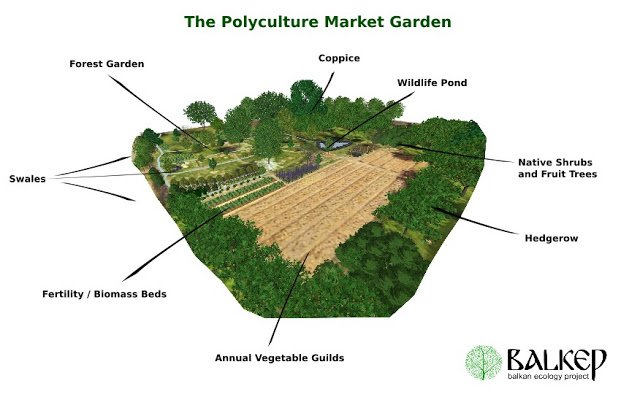
Permaculture/Polyculture Market Garden @Balkan Ecology Project
The main questions we are asking during this study are:
How can we provide nutritious affordable food whilst enhancing biodiversity?
How productive can polycultures be ?
How much time does it take to establish and manage such a garden?
What income can be expected from running such a garden ?
How bio-diverse can our food producing systems be and how can we measure this?
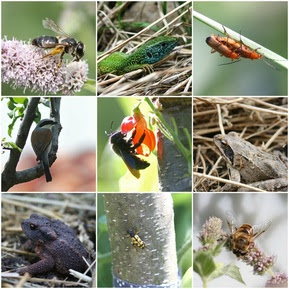
Some of the resident wildlife from our permaculture market garden.
Why are we undertaking this study ?
The demand for local, biologically cultivated food appears to be on the increase, as is a general desire to promote and preserve biodiversity. As far as we understand, small scale biologically cultivated polyculture gardens seem a practical, accessible and realistic way of providing food for humans whilst preserving and promoting biological diversity in the environment. With what appears to us to be a high demand and low supply situation, we ask why are there not more of these enterprises around? To explore the issue in more depth we are undertaking a multi-year study looking at the economics of running such a garden, and how productive it can be in terms of yields, income and biodiversity.
Study Goals
To develop functional market garden models that are both productive for humans and wildlife
To provide a unique and comprehensive learning experience to the participants of the study
To take detailed records of our activity and provide a valuable reference for others
To provide a template for further research
.jpg)
Our Polyculture Market Garden - photo by Huma
Why should you take part ?
This is an excellent opportunity if you are considering starting a garden and/or are interested in ways to provide affordable healthy food whilst increasing biodiversity.
As a participant of this study -
You will gain valuable insight into what it takes to actually run a market garden. As well as the practical skills you will develop, we'll dedicate time each week to cover essential theory, including site design and implementation, plant propagation, polyculture management, basic botany, record keeping, harvesting, irrigation, marketing and advertising, and budgeting/financial planning.
Enrollment to the 6 month program entitles you to participate in courses and training events that take place during the program.
You will be contributing to an area of research where little information exists i.e the productivity of polycultures and associated biodiversity dynamics.
This study will be published online and freely available to all for future reference and you will be credited accordingly.
You will be spending time in a truly unique area of the world, working as part of a dynamic team of fellow enthusiasts in an inspiring environment.

2015 team at work in the gardens
Where will you be?
The project is based in the town of Shipka, Bulgaria on the foothills of the Central Balkan mountain range in the Rose Valley. It's an area of high biodiversity, beautiful countryside and historical sites of global, cultural and scientific significance. The project site is located on an abandoned piece of agricultural land on the western outskirts of the town that we call the Paulownia Garden. See Map for Paulownia Garden Location.
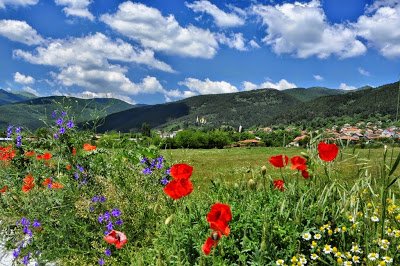
Shipka Town - home to Balkan Ecology Project
You'll also be learning from our existing garden, a 10 year old residential property with a highly productive and well established forest garden composed of over 400 species of plants. Our central garden is a good example of small scale intensive ecological design and includes examples of rainwater harvesting, grey water reed beds, wildlife ponds, multiple composting facilities and hosts a small plant nursery. We practice various methods of biological vegetable production including guild planting and crop rotation, and rear pigs, chickens and rabbits from this property.
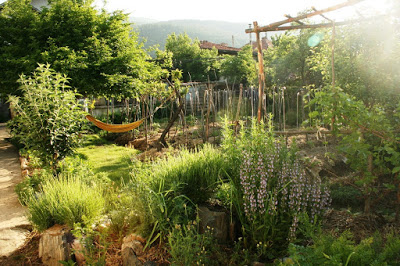
The Home Garden
What will you be doing?
You'll be working closely as a team producing food from the market garden for yourself, local markets, and food coops and will be recording all aspects of the process including how long it takes to develop, maintain and manage, the associated costs, the fertility requirements, the returns in produce weight and income derived from the sale of the produce.
Specific activities include the following:-
Propagating the crops
Trialing new polycultures
Record keeping
Harvesting and preparing produce for market.
Managing beneficial habitats and the forest garden.
Designing new polycultures
Click below for registration
http://www.balkep.org/the-polyculture-market-garden-study.html
Here's what last years participants said!
" Being a part of the Polyculture Study was a very special period of my life. I realized how inspiring it is to be in touch with soil and plants, and creatures inhabiting the garden I worked in, and also to be in good touch with the people I worked with"
"It made an impression on me so much so that I'm going back this year to participate from the beginning to see the know-hows of food growing in cooperation with nature." Kata Prodanov
" I am happy to have had this opportunity to support the Study and the wonderful family behind it, and to be supported by them in return." Anna Boncheva
"It's a nice journey that gives you the chance to study in depth in your free time" Plamen Petkov
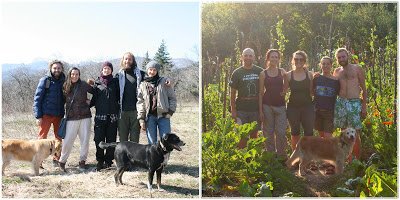
Last years incredible team :)